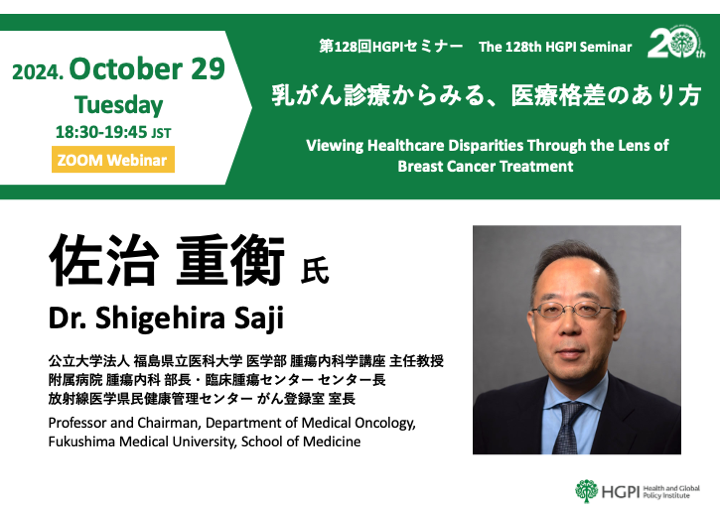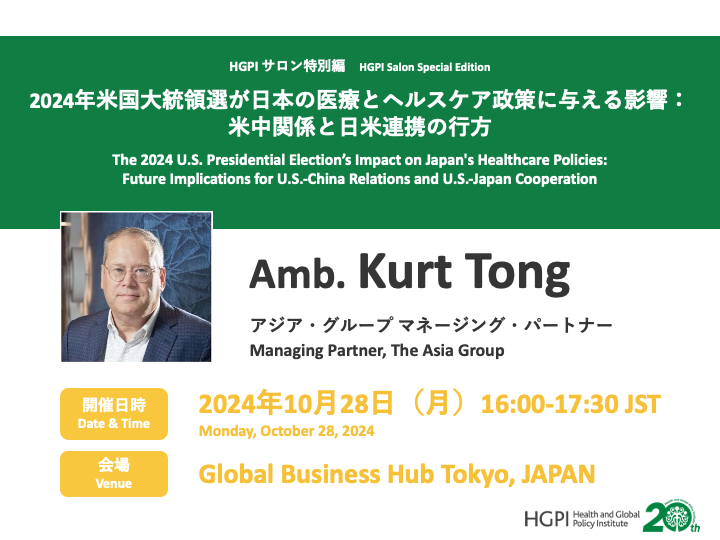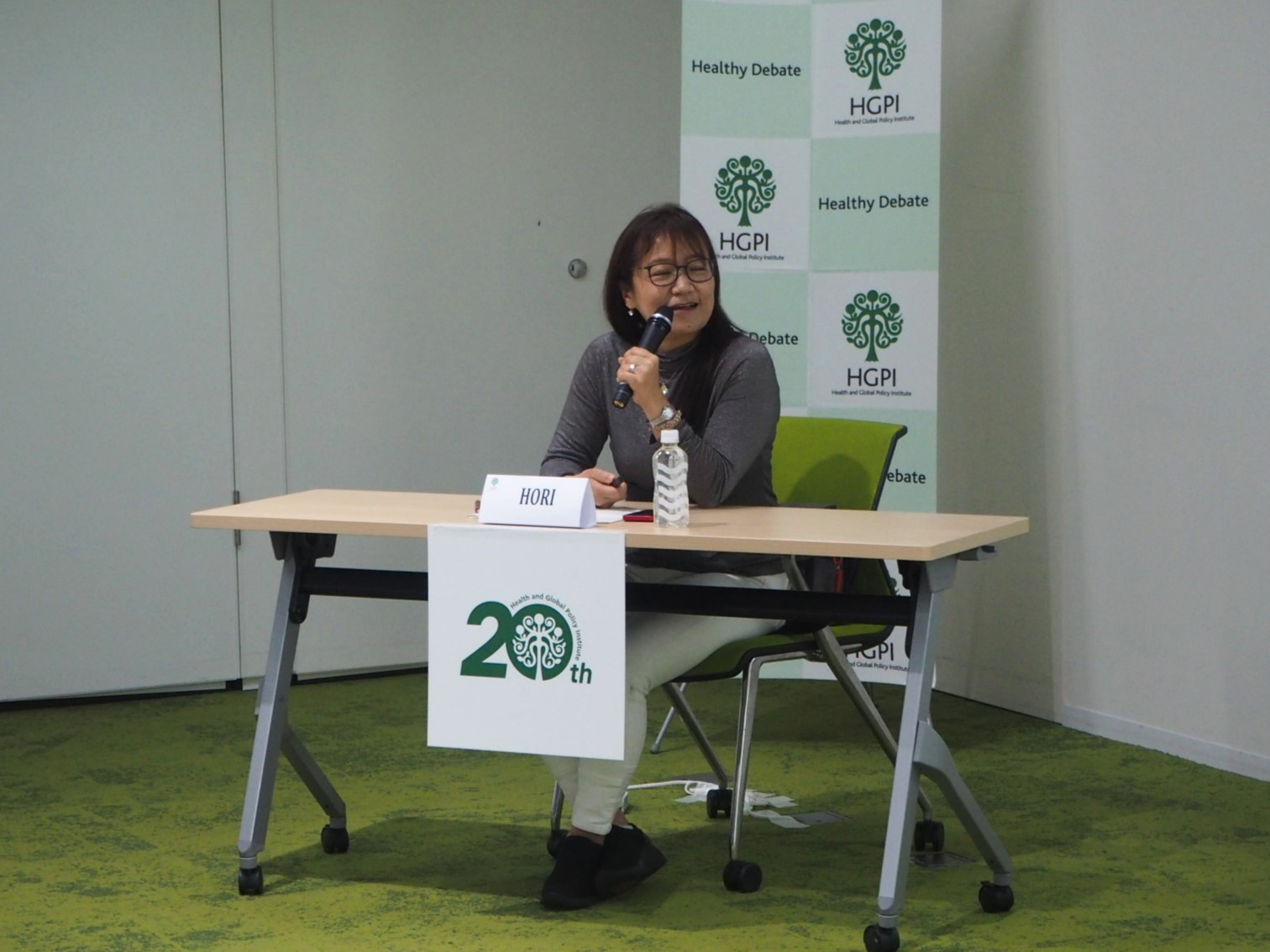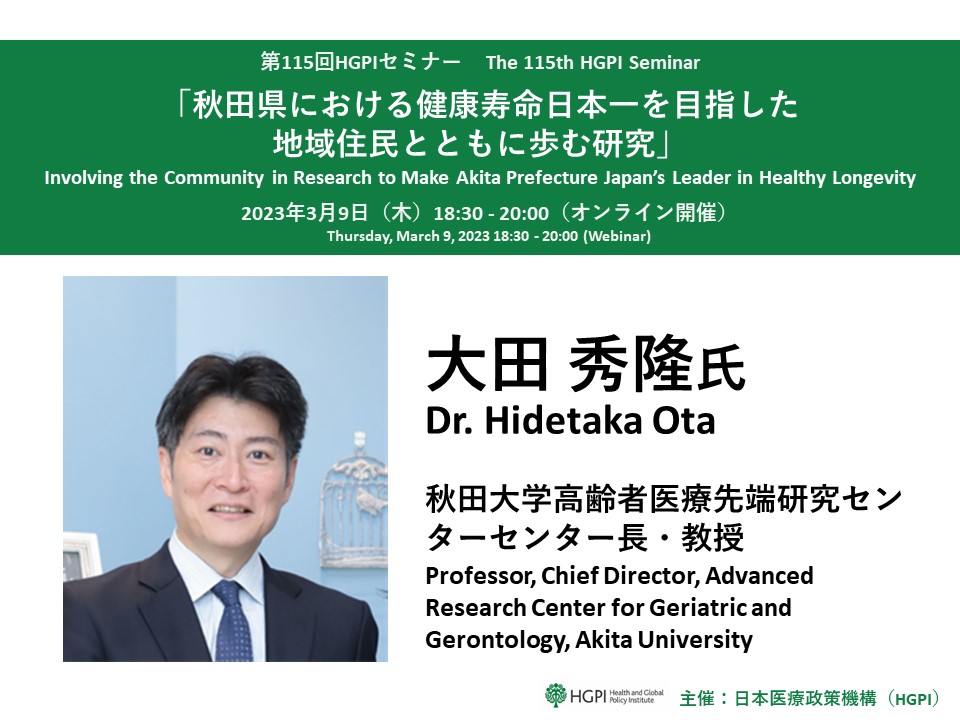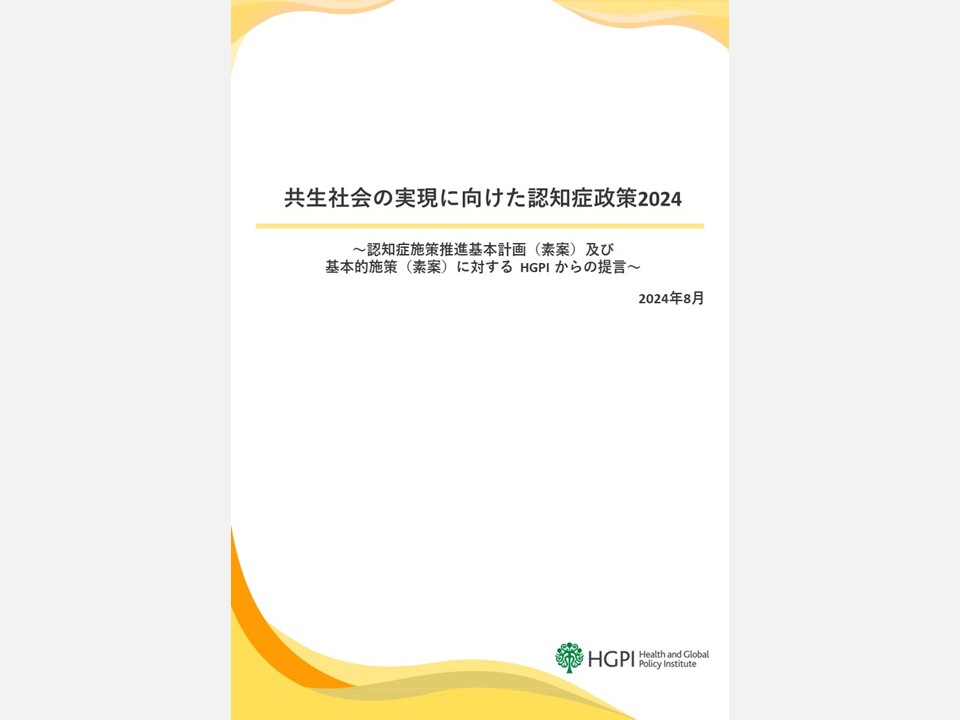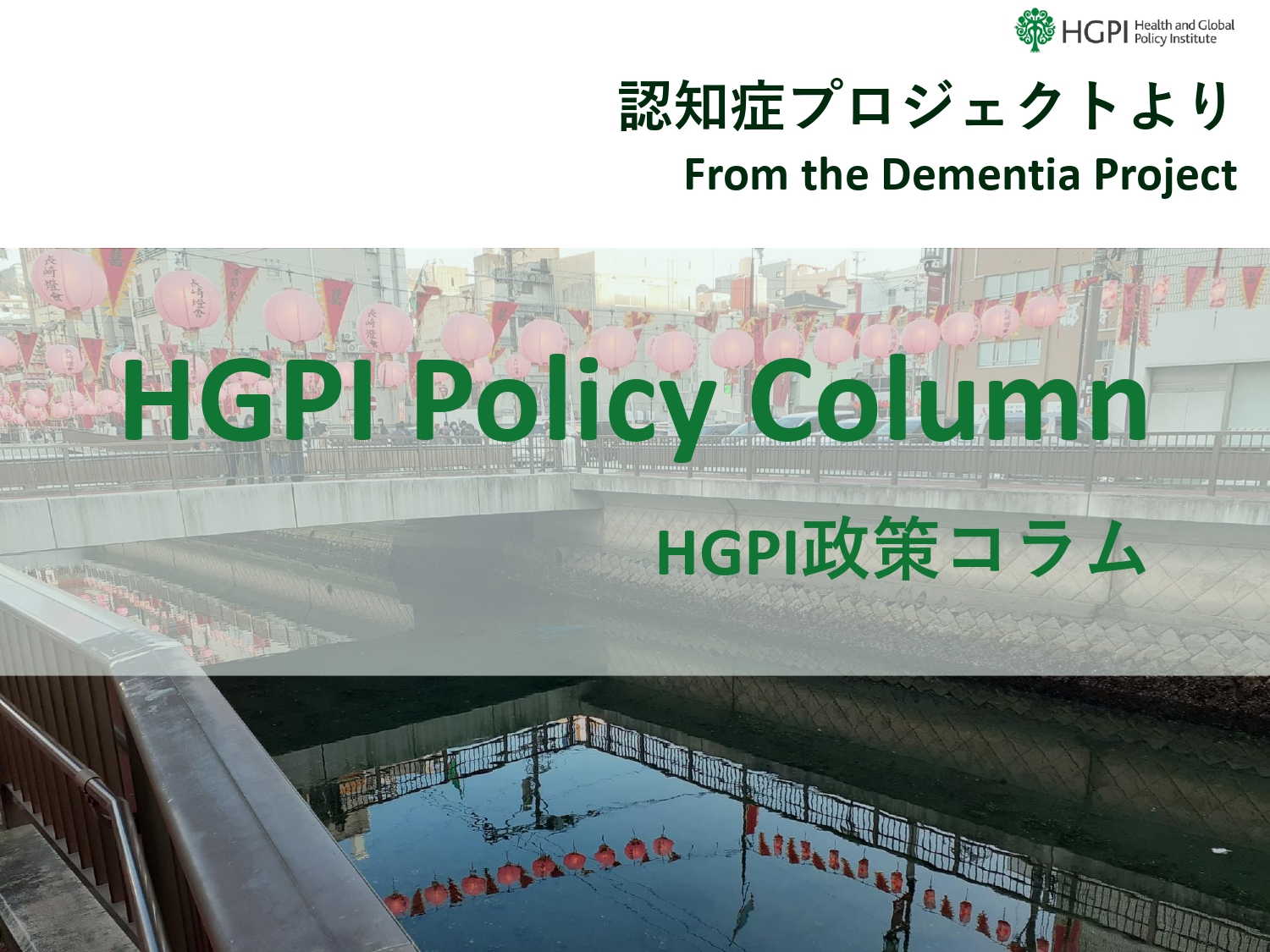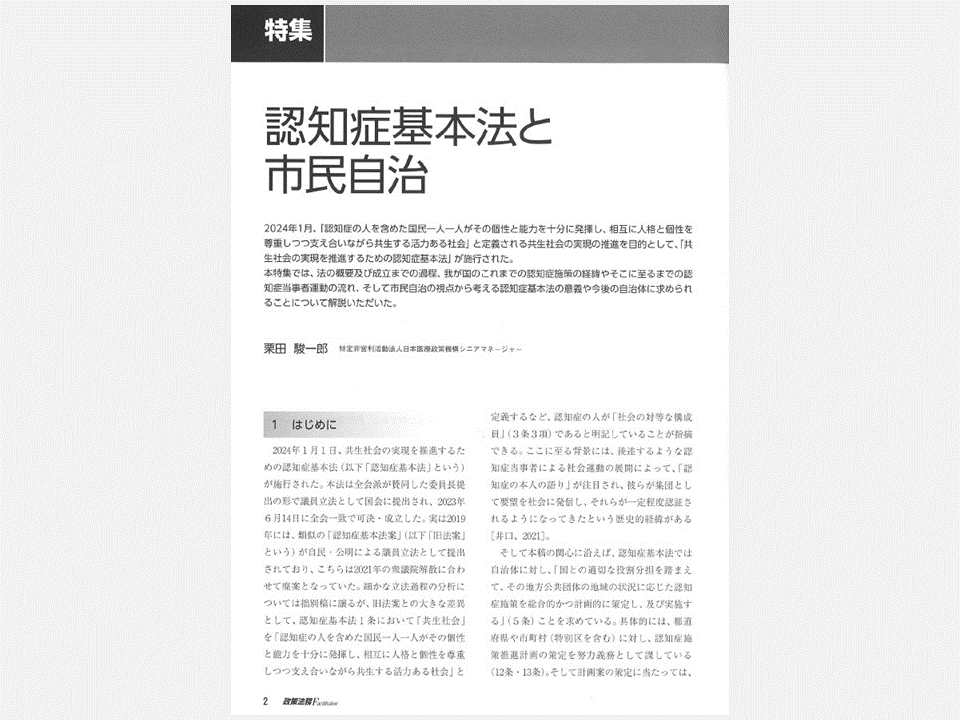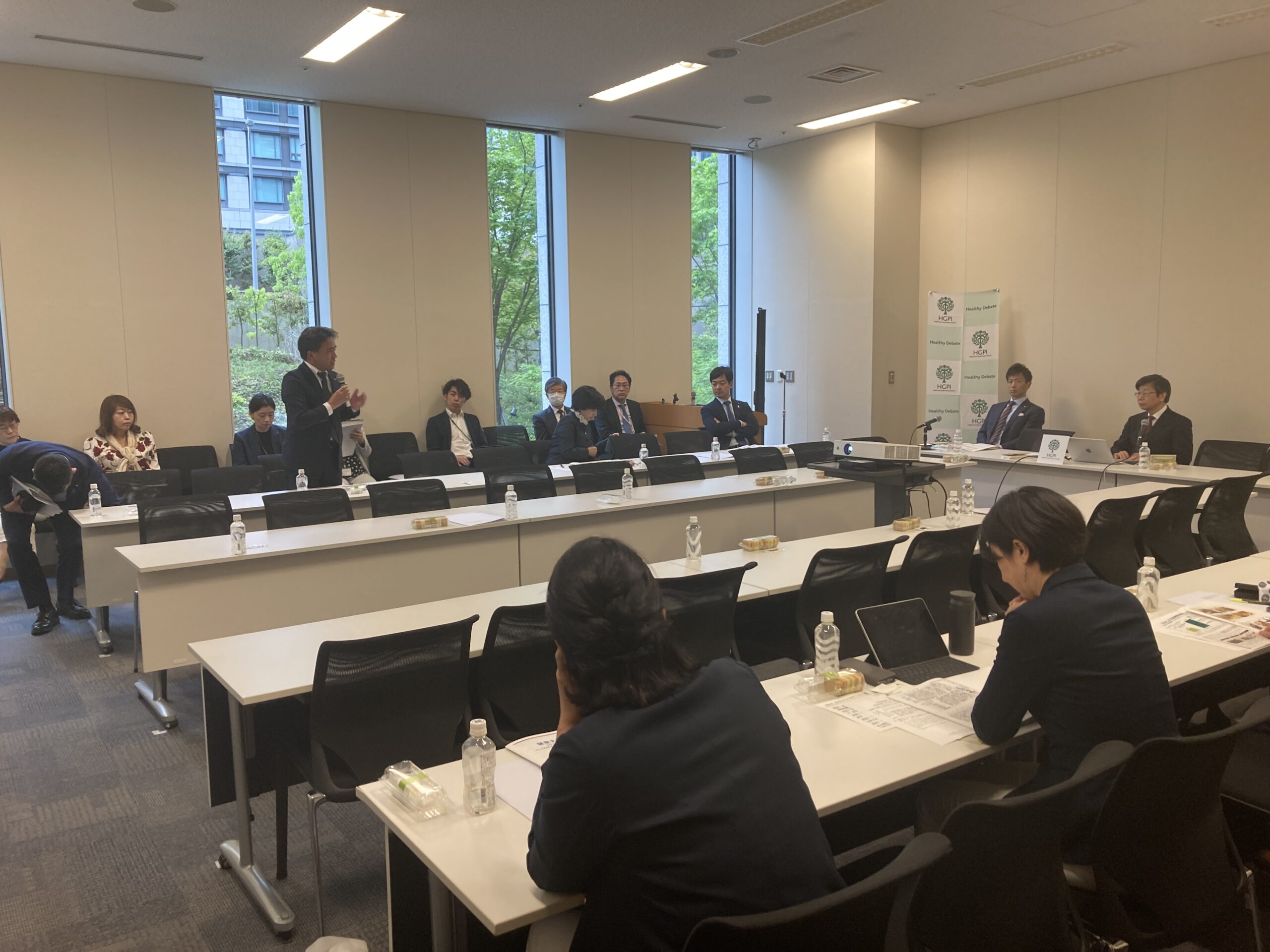[Event Report] HGPI Special Seminar Commemorating Dementia Month and World Alzheimer’s Month “Examining the Role of Industry in Creating a Dementia-Inclusive Society” (September 19, 2024)
date : 10/10/2024
Tags: Dementia, HGPI Seminar
![[Event Report] HGPI Special Seminar Commemorating Dementia Month and World Alzheimer’s Month “Examining the Role of Industry in Creating a Dementia-Inclusive Society” (September 19, 2024)](https://hgpi.org/en/wp-content/uploads/sites/2/HGPIseminar_202409-1.jpg)
Health and Global Policy Institute (HGPI) held an HGPI Special Seminar to commemorate Dementia Month and World Alzheimer’s Month for 2024. At the seminar, Mr. Nobuyuki Kii of the Japan Research Institute, Limited and Mr. Takeyuki Murata of Nippon Cultural Broadcasting Inc. introduced initiatives for dementia being undertaken at their respective companies. They also shared case studies to chart the current position of companies in the creation of a dementia-inclusive society and to consider the roles that companies should fulfill in the future.
Key points of the seminar
- Private companies have various points of contact with people living with dementia, their families, and other related parties, and they can contribute to the creation of a dementia-inclusive society by deepening understanding of dementia and introducing measures that reflect the perspectives of people living with dementia.
- There is a wide variety of unique characteristics among different businesses. It is important for private companies to leverage those characteristics to advance measures for and communicate about dementia.
- At the same time, people living with dementia, their families, or other related parties face challenges in terms of remaining in the workforce, and these challenges vary by sector or company structure. As the first step in addressing this, it will be essential to create workplace environments where people can tell those around them that they are facing challenges.
Overview of Mr. Kii’s Lecture
Efforts from the Japan Research Institute, Limited aim to make society an inclusive, cooperative place, where life is easy for everyone, regardless of whether they are living with dementia or not. These efforts include conducting survey research and operating secretariats for policy promotion at the Ministry of Economy, Trade and Industry (METI) and the Ministry of Health, Labour and Welfare (MHLW). They also provide local governments with support in formulating plans and are involved in a wide range of survey research and business development initiatives from private companies. It is said Japan is experiencing “An era when 10 million people are living with dementia.” In other words, it has become a time when dementia has become a topic close at hand for everyone. In that context, private companies possess a wide variety of points of contact with people living with dementia, which can be categorized under four main roles: (1) as providers of products and services; (2) as neighbors and citizens; (3) as employers and providers of workplaces for people living with dementia; and (4) as employers for the family members of people living with dementia. In recent years, the Japan Research Institute, Limited has advanced a number of initiatives centered on these four roles. Mr. Kii has high expectations for the number of such initiatives to further increase and, in addition to supporting each stakeholder in these initiatives, he would like for the Japan Research Institute, Limited to generate recommendations through various surveys that grasp real-world circumstances surrounding dementia.
Overview of Mr. Murata’s Lecture
Radio is a medium that is used by all age groups, not only by middle-aged and older adults. In recent years, an increasing number of people have been tuning in through online applications, and various changes are being made to programs to keep up with the times, such as by linking them to social networks. In particular, radio programs and advertisements are seen as closely linked to online searches or purchasing behavior, so it is a medium that is characterized by its ability to encourage listeners to take action. In addition to regular programs that provide information on dementia and long-term care, Nippon Cultural Broadcasting Inc. also aired a special program hosted by Mr. Shigeru Kajiwara, who lives with Alzheimer’s disease and served as its main personality. They also ran a campaign for Dementia Month in September, which included airing related programs and creating a special website. As an audio-based medium, radio is a familiar part of everyday life and is characterized by its ability to create empathy and elevate engagement through the communication that occurs between programs and listeners via spoken language. To help create a dementia-inclusive society, Mr. Murata would like for Nippon Cultural Broadcasting Inc. to carefully craft programs to deliver audio that allows people to create places where they feel they belong, even for people who live alone.
Panel discussion overview
During the panel discussion, which was titled “The Role of Industry in Creating a Dementia-Inclusive Society,” we deepened discussions on areas that were not touched upon during the lectures.
To begin, on the subject of changing attitudes inside companies through dementia-related projects, participants pointed out that listening to and getting involved with people living with dementia can shift how the condition is perceived and help create an atmosphere that encourages employees to continue such efforts.
Participants also discussed establishing workplace environments that look ahead to when employees develop dementia themselves or start providing long-term care to a relative who develops dementia. While there are issues specific to industry, employment type, or company size, they shared the opinion that first, it will be necessary to create workplace environments where employees do not hesitate to communicate that they are experiencing obstacles to their work, for both dementia and for other challenges. Participants also shared the opinion that based on such issues and opinions, companies must take steps to establish workplace environments and create systems to provide both physical and psychological support.
Panelists also shared views on what will be necessary for many companies in Japanese society to promote the attitude that dementia impacts everyone. From the perspective of radio-based projects, Mr. Murata said that instead of portraying the difficulties of dementia, he would like to produce programs that help create an environment in which the people of today learn to view dementia as something that is commonplace by emphasizing ease of understanding and context through the limited information that can be conveyed with audio. Mr. Kii said that he hopes to contribute to better experiences in everyday life for people living with dementia and their families by developing products and services that are based on the opinions of people living with dementia (a current area of focus for the Japan Research Institute, Limited) to create an environment where responding to dementia can create sustainable businesses. He also shared that in the future, he would also like to encourage each company to take what actions they can to reshape how they view and respond to dementia.
In a rare occurrence for an HGPI Seminar, this event on the theme of “Examining the Role of Industry in Creating a Dementia-Inclusive Society” featured speakers from two private companies. One characteristic that was common to both speakers’ companies was that they are engaged in communicating to and encouraging society through the services they provide, which allows us to reaffirm that in addition to initiatives at individual companies, another role of companies is to involve various stakeholders in society. After the lectures, we received many questions from the audience, which made for a lively seminar.
[Event Overview]
-
Speakers: (in no particular order; titles omitted)
Nobuyuki Kii (General Manager and Principal, Research and Consulting Division, The Japan Research Institute, Limited)
Takeyuki Murata (General Manager, Operations Division, Program Section, Nippon Cultural Broadcasting Inc.) - Date & Time: Thursday, September 19, 2024; 15:00-17:00 JST
- Format: Online (Zoom webinar) (Not available for recording)
*The presentation slides and edited recording will be shared with individual supporting members only at a later date. - Language: Japanese
- Participation Fee: Free
- Capacity: 500 participants
[Program]
| 15:00-15:05 | Opening Remarks and Explanatory Introduction |
| Shunichiro Kurita (Senior Manager, HGPI) | |
| 15:05-15:30 | Case study 1: The Japan Research Institute, Limited |
| Mr. Nobuyuki Kii (General Manager and Principal, Research and Consulting Division, The Japan Research Institute, Limited) | |
| 15:30-15:40 | Q&A with Mr. Kii |
| 15:40-16:05 | Case study 2: Nippon Cultural Broadcasting Inc. |
| Mr. Takeyuki Murata (General Manager, Operations Division, Nippon Cultural Broadcasting Inc.) | |
| 16:05-16:15 | Q&A with Mr. Murata |
| 16:15-16:50 | Panel Discussion: The Role of Industry in Creating a Dementia-Inclusive Society |
| Mr. Nobuyuki Kii (General Manager and Principal, Research and Consulting Division, The Japan Research Institute, Limited) Mr. Takeyuki Murata (General Manager, Operations Division, Nippon Cultural Broadcasting Inc.) Moderator: Shunichiro Kurita (Senior Manager, HGPI) |
◼︎Profile
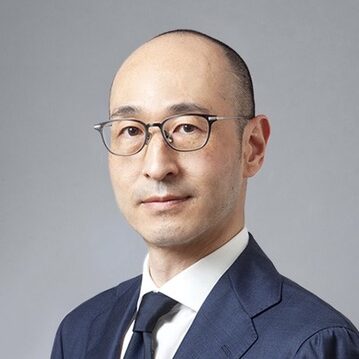 Mr. Nobuyuki Kii (General Manager and Principal, Research and Consulting Division, The Japan Research Institute, Limited)
Mr. Nobuyuki Kii (General Manager and Principal, Research and Consulting Division, The Japan Research Institute, Limited)
Mr. Nobuyuki Kii graduated from the Kyoto University School of Economics in 1999 and joined The Japan Research Institute, Limited. While working, he later obtained an MBA from Kobe University. At The Japan Research Institute, Limited, Mr. Kii’s past duties have included business-to-consumer consulting in marketing and new business development. In his current role, which he assumed in April 2018, Mr. Kii’s duties involve public-private research and consulting in the field of services for elderly people and long-term care based on the concept of “Contributing to the creation of a super-aging society that is full of well-being by serving as a hub for industry, government, academia, long-term care settings, and policy.” Starting with the Ministry of Economy, Trade and Industry (METI) Orange Innovation Project, Mr. Kii contributes to advancing a variety of projects related to dementia for the national Government, local governments, and industry.
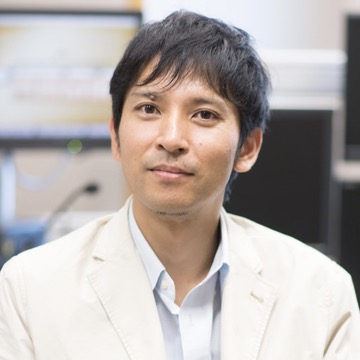 Mr. Takeyuki Murata (General Manager, Operations Division, Nippon Cultural Broadcasting Inc.)
Mr. Takeyuki Murata (General Manager, Operations Division, Nippon Cultural Broadcasting Inc.)
Mr. Takeyuki Murata joined Nippon Cultural Broadcasting Inc. in 1998. After being involved in advertising operations as a member of the Sales Section, he transferred to the Program Section, where his duties mainly involved production on information and variety programs. Specials produced by Mr. Murata have won awards such as the Japan Commercial Broadcasters Association Award and the Japan Broadcast Culture Award. He later transferred to the Management Section, where he was involved in a broad variety of operations including management planning, strategic planning, campaigns, events, new projects, CSR, and alliances. In addition to serving as a producer for business-related programs, his current duties include planning and implementing various campaigns and company projects.
Top Research & Recommendations Posts
- [Research Report] Building a Mental Health Program for Children and Measuring its Effectiveness (June 16, 2022)
- [Research Report] 2019 Survey on Healthcare in Japan
- [Announcement] A Turning Point Towards Building Green Healthcare Systems (June 5, 2024)
- [Policy Recommendations] Developing a National Health and Climate Strategy for Japan (June 26, 2024)
- [Research Report] The 2023 Public Opinion Survey on Satisfaction in Healthcare in Japan and Healthcare Applications of Generative AI (January 11, 2024)
- [Policy Recommendations] Obesity Control Promotion Project 2023 “The Next Steps for Engaging and Cooperating with Patients, Citizens, and Communities for Implements of Obesity Control Measurements” (April 8, 2024)
- [New Report] Policy Priorities for Super-Ageing Japan: Health Innovation and Economic Growth in the COVID-19 Pandemic Era (February 24, 2021)
- [Policy Recommendations] Kidney Disease Control Promotion Project 2023 “Establishing Kidney Disease Control Measures with Patient, Citizen, and Community Engagement and Collaboration” Policy Recommendations, a Collection of Good Practices of Chronic Kidney Disease (CKD) and Control Measures in Local Governments (February 14, 2024)
- [Report and Recommendations] Discussion Points in Healthcare DX Project Expert Panel Meeting (April 2, 2024)
- [Policy Recommendations] Achieving Equity in Multidisciplinary Pain Treatment and Support Systems for Pain Management (March 31, 2023)
Featured Posts
-
2024-10-07
[Registration Open] Planetary Health Expert Meeting “Building the Future of Healthcare: A Vision for Sustainable and Resilient Health Systems with GGHH” (November 5, 2024)
![[Registration Open] Planetary Health Expert Meeting “Building the Future of Healthcare: A Vision for Sustainable and Resilient Health Systems with GGHH” (November 5, 2024)](https://hgpi.org/en/wp-content/uploads/sites/2/ph-20241105-topr2.jpg)
-
2024-10-28
[Registration Open] (Hybrid Format) Public Symposium “Promoting CVD Control Based on the Needs of People Living with or Affected by Cardiovascular Diseases: Towards Effective Implementation of the Second Phase CVD Control Plans” (November 22, 2024)
![[Registration Open] (Hybrid Format) Public Symposium “Promoting CVD Control Based on the Needs of People Living with or Affected by Cardiovascular Diseases: Towards Effective Implementation of the Second Phase CVD Control Plans” (November 22, 2024)](https://hgpi.org/en/wp-content/uploads/sites/2/cvd-ncd-20241122-top.png)
-
2024-10-30
[Event Report] Advisory Board Meeting for Meaningful Involvement Promotion Project “Promoting People with Lived Experience Participation in Policy-Making: Building a Social Foundation for Proactive Engagement” (September 11, 2024)
![[Event Report] Advisory Board Meeting for Meaningful Involvement Promotion Project “Promoting People with Lived Experience Participation in Policy-Making: Building a Social Foundation for Proactive Engagement” (September 11, 2024)](https://hgpi.org/en/wp-content/uploads/sites/2/mip_20240911.jpg)
-
2024-10-31
[HGPI Policy Column] (No.49) From the Mental Health Project ”Changes in the Japanese Mental Health Policy and Future Policy Topics” (The 2nd part ”Issues surrounding long-term hospitalization and future policy topics”)
![[HGPI Policy Column] (No.49) From the Mental Health Project ”Changes in the Japanese Mental Health Policy and Future Policy Topics” (The 2nd part ”Issues surrounding long-term hospitalization and future policy topics”)](https://hgpi.org/en/wp-content/uploads/sites/2/column-49-top.png)
-
2024-11-01
[Registration Open] Designing for Dementia Briefing Session 2024 – Conversations on the Trajectory of Our Activities and Envisioning the Future (December 3, 2024)
![[Registration Open] Designing for Dementia Briefing Session 2024 – Conversations on the Trajectory of Our Activities and Envisioning the Future (December 3, 2024)](https://hgpi.org/en/wp-content/uploads/sites/2/dementia-20241203-top.png)




